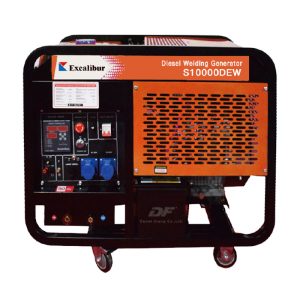In the realm of backup power solutions and primary power sources for remote locations, diesel generators have long been a cornerstone.
They are essential for a variety of applications due to their dependability, sturdiness, and effectiveness. However, a key aspect that potential buyers and users frequently focus on is fuel efficiency and consumption. This article delves into the intricacies of diesel generator fuel efficiency, factors influencing fuel consumption, and best practices to optimize the performance of your diesel generator.
What is Fuel Efficiency in Diesel Generators?
Fuel efficiency in diesel generators is a measure of how effectively the generator converts diesel fuel into electrical power. Usually, fuel consumption is expressed as a number per kilowatt-hour (kWh) of power produced. A more fuel-efficient generator will consume less diesel to produce the same amount of power, making it cost-effective and environmentally friendly.
Calculating Fuel Efficiency
The fuel efficiency of a diesel generator can be calculated using the following formula:
Fuel Efficiency (kWh/L)=Power Output (kW)/Fuel Consumption (L/hour)
For instance, if a generator consumes 10 liters of diesel per hour and produces 50 kW of power, its fuel efficiency is:
Fuel Efficiency=1050=0.2 liters/kWhFuel Efficiency=5010=0.2 liters/kWh
Lower values indicate higher efficiency, as less fuel is used to generate each kilowatt-hour of power.
Factors Influencing Fuel Efficiency
Several factors influence the fuel efficiency of diesel generators, including the generator’s load, engine design, maintenance, and operational conditions.
Load Factor
The load factor, or the percentage of the generator’s capacity being used, significantly impacts fuel efficiency.
Generators achieve peak efficiency when operating at about 75-80% of their maximum load. Too little load on a generator can result in “wet stacking,” a condition in which unburned fuel builds up in the exhaust system reduces efficiency, and perhaps causes damage.
Engine Design
Modern diesel generators incorporate advanced technologies to boost fuel efficiency. Fuel consumption is decreased and combustion efficiency is increased with features like electronic fuel injection, intercooling, and turbocharging. When selecting a generator, opting for newer models with these technologies can lead to better fuel efficiency.
Maintenance
Sustaining maximum fuel economy requires routine maintenance. This includes routine checks and replacements of air filters, fuel filters, and oil. Filters that are blocked or dirty can impede fuel and airflow, making the engine work harder and consume more fuel. Additionally, timely servicing and calibration of the fuel injection system can prevent fuel wastage.
Operational Conditions
The environment in which the generator operates also affects fuel efficiency. High ambient temperatures can decrease efficiency, as the engine must work harder to stay cool. Similarly, operating at high altitudes can reduce efficiency due to lower oxygen levels. Effective ventilation and cooling systems can help alleviate these effects.
Understanding Fuel Consumption
Fuel consumption refers to the amount of diesel fuel used by the generator over a specific period, usually measured in liters per hour. It is essential to comprehend and regulate fuel usage in order to keep operating expenses under control and guarantee effective generator management.
Typical Fuel Consumption Rates
Fuel consumption rates vary based on the size and capacity of the generator. Here are some typical fuel consumption rates for different generator sizes:
- Small generators (5-10 kW): Approximately 1-2 liters per hour
- Medium generators (10-50 kW): Approximately 2-6 liters per hour
- Large generators (50-200 kW): Approximately 6-20 liters per hour
- Industrial generators (200+ kW): Over 20 liters per hour
Load-Dependent Consumption
Fuel consumption is directly proportional to the load on the generator. As the load increases, the generator consumes more fuel. For instance, a generator running at 50% load will consume less fuel than the same generator running at full capacity. It is essential to match the generator’s capacity to the expected load to optimize fuel consumption.
Measuring Fuel Consumption
Accurately measuring fuel consumption helps in planning fuel supply and managing costs. This can be done using:
- Fuel Meters: Installed in the fuel line, these meters provide real-time data on fuel usage.
- Manual Calculation: By recording the generator’s run time and the amount of fuel used, one can calculate the consumption rate.
Tips for Optimizing Fuel Efficiency and Consumption

To get the most out of your diesel generator, consider the following best practices:
Load Management
Ensure that the generator operates at an optimal load. Avoid running the generator at very low loads for extended periods. Use load banks to simulate load and maintain efficiency if necessary.
Regular Maintenance
Follow a strict maintenance schedule. Make sure that the fuel injection system is correctly calibrated, and conduct routine checks and replacements of the air and fuel filters. Use high-quality lubricants and fuel to maintain engine health.
Upgrade and Modernize
Consider upgrading older generators to modern, more fuel-efficient models. Efficiency can be greatly increased by putting cutting-edge technologies like variable speed control and electronic fuel injection into practice.
Environmental Control
Ensure the generator operates in favorable conditions. Sustain ideal operating temperatures by providing sufficient ventilation and cooling systems. If operating in high altitudes, consider using turbocharged engines to compensate for reduced oxygen levels.
Training and Monitoring
Train personnel on best practices for operating and maintaining generators. Use monitoring systems to track fuel consumption and efficiency in real time, allowing for timely interventions and adjustments.
Conclusion
Understanding diesel generator fuel efficiency and consumption is crucial for optimizing performance and controlling operational costs. By considering factors such as load management, regular maintenance, and the use of modern technologies, you can ensure your diesel generator operates at peak efficiency. With proper care and management, diesel generators remain a reliable and cost-effective power solution for a wide range of applications.
Investing in efficient diesel generators and following best practices not only enhances performance but also promotes environmental sustainability by reducing fuel consumption and emissions. As a leading diesel generator manufacturer, we are committed to providing high-quality, efficient generators that meet your power needs while ensuring optimal fuel efficiency and minimal environmental impact.



